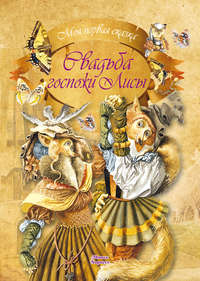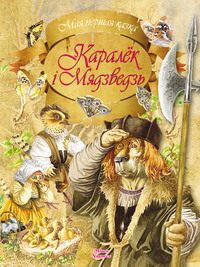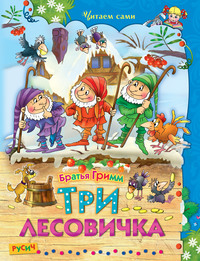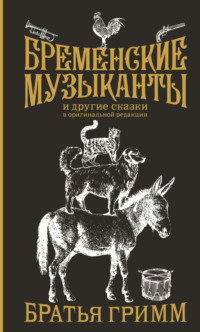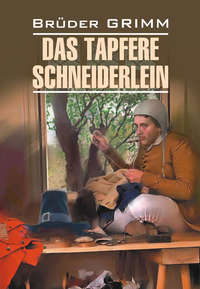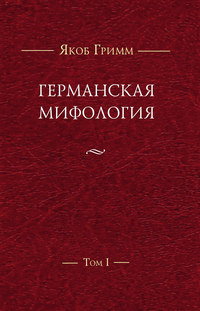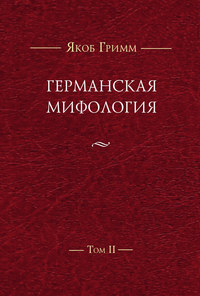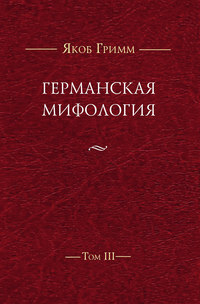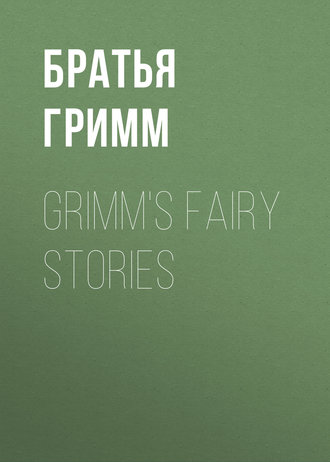 полная версия
полная версияGrimm's Fairy Stories
"You shall have that because you are so industrious," said Mother Holle; and at the same time she gave her back the shuttle which she had let fall into the well. Thereupon the door closed, and the maiden found herself up above upon the earth, not far from her mother's house.
And as she went into the yard the cock cried: "Cock-a-doodle-doo! Your golden girl's come back to you!"
So she went in to her mother, and as she arrived thus covered with gold, she was well received, both by her and her sister.
The girl told all that had happened to her; and as soon as the mother heard how she had come by so much wealth, she was very anxious to obtain the same good luck for the ugly and lazy daughter. She had to seat herself by the well and spin; and in order that her shuttle might be stained with blood, she stuck her hand into a thorn-bush and pricked her finger. Then she threw her shuttle into the well, and jumped in after it.
She came, like the other, to the beautiful meadow and walked along the very same path. When she got to the oven the bread again cried, "Oh, take me out! take me out! or I shall burn; I have been baked a long time!" But the lazy thing answered, "As if I had any wish to make myself dirty!" and on she went. Soon she came to the apple-tree, which cried, "Oh, shake me! shake me! we apples are all ripe!" But she answered, "I like that! one of you might fall on my head," and so went on.
When she came to Mother Holle's house she was not afraid, for she had already heard of her big teeth, and she hired herself to her immediately.
The first day she forced herself to work diligently, and obeyed Mother Holle when she told her to do anything, for she was thinking of all the gold that she would give her. But on the second day she began to be lazy, and on the third day still more so, and then she would not get up in the morning at all. Neither did she make Mother Holle's bed as she ought, and did not shake it so as to make the feathers fly up. Mother Holle was soon tired of this, and gave her notice to leave. The lazy girl was willing enough to go, and thought that now the golden rain would come. Mother Holle led her, too, to the great door; but while she was standing beneath it, instead of the gold a big kettleful of pitch was emptied over her. "That is the reward of your service," said Mother Holle, and shut the door.
So the lazy girl went home; but she was quite covered with pitch, and the cock by the well-side, as soon as he saw her, cried: "Cock-a-doodle-doo! Your pitchy girl's come back to you." But the pitch stuck fast to her, and could not be got off as long as she lived.
THE FROG PRINCE
In the olden time, when wishing was having, there lived a King, whose daughters were all beautiful; but the youngest was so exceedingly beautiful that the Sun himself, although he saw her very, very often, was delighted every time she came out into the sunshine.
Near the castle of this King was a large and gloomy forest, where in the midst stood an old lime-tree, beneath whose branches splashed a little fountain; so, whenever it was very hot, the King's youngest daughter ran off into this wood, and sat down by the side of the fountain; and, when she felt dull, would often divert herself by throwing a golden ball up into the air and catching it again. And this was her favorite amusement.
Now, one day it happened that this golden ball, when the King's daughter threw it into the air, did not fall down into her hand, but on to the grass; and then it rolled right into the fountain. The King's daughter followed the ball with her eyes, but it disappeared beneath the water, which was so deep that she could not see to the bottom. Then she began to lament, and to cry more loudly and more loudly; and, as she cried, a voice called out, "Why weepest thou, O King's daughter? thy tears would melt even a stone to pity." She looked around to the spot whence the voice came, and saw a frog stretching his thick, ugly head out of the water. "Ah! you old water-paddler," said she, "was it you that spoke? I am weeping for my golden ball which bounced away from me into the water."
"Be quiet, and do not cry," replied the Frog; "I can give thee good assistance. But what wilt thou give me if I succeed in fetching thy plaything up again?"
"What would you like, dear Frog?" said she. "My dresses, my pearls and jewels, or the golden crown which I wear?"
The Frog replied, "Dresses, or jewels, or golden crowns, are not for me; but if thou wilt love me, and let me be thy companion and playmate, and sit at thy table, and eat from thy little golden plate, and drink out of thy cup, and sleep in thy little bed, – if thou wilt promise me all these things, then I will dive down and fetch up thy golden ball."
"Oh, I will promise you all," said she, "if you will only get me my golden ball." But she thought to herself, "What is the silly Frog chattering about? Let him stay in the water with his equals; he cannot enter into society." Then the Frog, as soon as he had received her promise, drew his head under the water and dived down. Presently he swam up again with the golden ball in his mouth, and threw it on to the grass. The King's daughter was full of joy when she again saw her beautiful plaything; and, taking it up, she ran off immediately. "Stop! stop!" cried the Frog; "take me with thee. I cannot run as thou canst."
But this croaking was of no avail; although it was loud enough, the King's daughter did not hear it, but, hastening home, soon forgot the poor Frog, who was obliged to leap back into the fountain.
The next day, when the King's daughter was sitting at table with her father and all his courtiers, and was eating from her own little golden plate, something was heard coming up the marble stairs, splish-splash, splish-splash; and when it arrived at the top, it knocked at the door, and a voice said —
"Open the door, thou youngest daughter of the King!"
So she arose and went to see who it was that called to her; but when she opened the door and caught sight of the Frog, she shut it again very quickly and with great passion, and sat down at the table, looking exceedingly pale.
But the King perceived that her heart was beating violently, and asked her whether it were a giant who had come to fetch her away who stood at the door. "Oh, no!" answered she; "it is no giant, but an ugly Frog."
"What does the Frog want with you?" said the King.
"Oh, dear father, yesterday when I was playing by the fountain, my golden ball fell into the water, and this Frog fetched it up again because I cried so much: but first, I must tell you, he pressed me so much, that I promised him he should be my companion. I never thought that he could come out of the water, but somehow he has managed to jump out, and now he wants to come in here."
At that moment there was another knock, and a voice said —
"King's daughter, youngest,Open the door.Hast thou forgottenThy promises madeAt the fountain so clear'Neath the lime-tree's shade?King's daughter, youngest.Open the door."Then the King said, "What you have promised, that you must perform; go and let him in." So the King's daughter went and opened the door, and the Frog hopped in after her right up to her chair: and as soon as she was seated, he said, "Lift me up;" but she hesitated so long that the King had to order her to obey. And as soon as the Frog sat on the chair he jumped on to the table and said, "Now push thy plate near me, that we may eat together." And she did so, but as every one noticed, very unwillingly. The Frog seemed to relish his dinner very much, but every bit that the King's daughter ate nearly choked her, till at last the Frog said, "I have satisfied my hunger, and feel very tired; wilt thou carry me upstairs now into thy chamber, and make thy bed ready that we may sleep together?" At this speech the King's daughter began to cry, for she was afraid of the cold Frog, and dared not touch him; and besides, he actually wanted to sleep in her own beautiful, clean bed!
But her tears only made the King very angry, and he said, "He who helped you in the time of your trouble must not now be despised!" So she took the Frog up with two fingers, and put him into a corner of her chamber. But as she lay in her bed, he crept up to it, and said, "I am so very tired that I shall sleep well; do take me up, or I will tell thy father." This speech put the King's daughter into a terrible passion, and catching the Frog up, she threw him with all her strength against the wall, saying "Now will you be quiet, you ugly Frog!"
But as he fell he was changed from a Frog into a handsome Prince with beautiful eyes, who after a little while became her dear companion and betrothed. One morning, Henry, trusted servant of the Prince, came for them with a carriage. When his master was changed into a frog, trusty Henry had grieved so much that he had bound three iron bands around his heart, for fear it should break with grief and sorrow. The faithful Henry (who was also the trusty Henry) helped in the bride and bridegroom, and placed himself in the seat behind, full of joy at his master's release. They had not proceeded far when the Prince heard a crack as if something had broken behind the carriage; so he put his head out of the window and asked trusty Henry what was broken, and faithful Henry answered, "It was not the carriage, my master, but an iron band which I bound around my heart when it was in such grief because you were changed into a frog."
Twice afterwards on the journey there was the same noise, and each time the Prince thought that it was some part of the carriage that had given way; but it was only the breaking of the bands which bound the heart of the trusty Henry (who was also the faithful Henry), and who was thenceforward free and happy.
THE TRAVELS OF TOM THUMB
There lived a tailor who had only one son, and he was extremely small, not any larger than your thumb, and so was called Tom Thumb.
However, he was a courageous little fellow, and he told his father, "Father, I am determined to go into the world to seek my fortune."
"Very well, my son," answered the old man, and taking a big darning needle, he made a top to it of sealing wax, and gave it to Tom Thumb, saying:
"There is a sword for you to use to defend yourself on your journeyings."
Then the little fellow, desiring to dine once more with his parents, popped into the kitchen to find out what his mother was preparing for his last dinner at home. All the dishes were ready to be taken in, and they were standing upon the hearth.
"What is it you have for dinner, dear mother?" he inquired.
"You can look for yourself," she replied.
Then Tom sprang up on to the hob, and peeped into all the dishes, but over one he leant so far, that he was carried up by the steam through the chimney, and then for some distance he floated on the smoke, but after a while he fell upon the ground once more.
Now, at last, Tom Thumb was really out in the wide world, and he went on cheerily, and after a time was engaged by a master tailor; but here the food was not so good as his mother's, and it was not to his taste.
So he said, "Mistress, if you will not give me better things to eat, I shall chalk upon your door, 'Too many potatoes, and not enough meat. Good-bye, potato-mill.'"
"I should like to know what you want, you little grasshopper!" cried the woman very angrily, and she seized a shred of cloth to strike him; however, the tiny tailor popped under a thimble, and from it he peeped, putting out his tongue at the mistress.
So she took up the thimble, meaning to catch him, but Tom Thumb hid himself amongst the shreds of cloth, and when she began to search through those, he slipped into a crack in the table, but put out his head to laugh at her; so she tried again to hit him with the shred, but did not succeed in doing so, for he slipped through the crack into the table drawer.
At last, though, he was caught, and driven out of the house.
So the little fellow continued his travels, and presently entering a thick forest, he encountered a company of robbers who were plotting to steal the king's treasure.
As soon as they saw the little tailor, they said to themselves, "A little fellow like this could creep through a keyhole, and aid us greatly." So one called out —
"Hullo, little man, will you come with us to the king's treasury? Certainly a Goliath like you could creep in with ease, and throw out the coins to us."
After considering awhile, Tom Thumb consented, and accompanied them to the king's treasury.
From top to bottom they inspected the door to discover a crack large enough for him to get through, and soon found one. He was for going in directly, but one of the sentinels happening to catch sight of him, exclaimed: "Here is indeed an ugly spider; I will crush it with my foot."
"Leave the poor creature alone," the other said; "it has not done you any harm."
So Tom Thumb slipped through the crack, and made his way to the treasury. Then he opened the window, and cast out the coins to the robbers who were waiting below. While the little tailor was engaged in this exciting employment, he heard the king coming to inspect his treasure, so as quickly as possible he crept out of sight. The king noticed that his treasure had been disarranged, and soon observed that coins were missing: but he was utterly unable to think how they could have been stolen, for the locks and bolts had not been tampered with, and everything was well fastened.
On going from the treasury, he warned the two sentinels, saying —
"Be on the watch, some one is after the money," and quite soon, on Tom Thumb setting to work again, they heard very clearly the coins ringing, chink, chank, as they struck one against the other.
As quickly as possible they unfastened the building and went in, hoping to take the thief.
But Tom Thumb was too quick for them, he sprang into a corner, and hiding himself behind a coin, so that nothing of him was visible, he made fun of the sentinels; crying "I am here!" Then when the men hurried to the spot where the voice came from, he was no longer there, but from a different place cried out: "Ha, Ha! here I am!"
So the sentinels kept jumping about, but so cleverly did Tom move from one spot to another, that they were obliged to run around the whole time, hoping to find somebody, until at length, quite tired out, they went off.
Then Tomb Thumb went on with his work, and one after another he threw all the coins out of the window, but the very last he sounded and rang with all his might and springing nimbly upon it, so flew through the window.
The robbers were loud in their praises.
"Indeed you are a brave fellow," they said, "will you be our captain?"
Tom Thumb, thanking them, declined this honor, for he was anxious to see more of the world. Then the booty was apportioned out, but only a ducat was given to the little tailor, for that was as much as he could carry.
So Tom girded on his sword again, and bidding farewell to the robbers, continued his travels.
He tried to get work under various masters, but they would have nothing to do with him, so after a while he took service at an inn. But the maids there disliked him, for he was about everywhere, and saw all that went on, without being seen himself; and he told their mistress of their dishonest ways, of what was taken off the plates, and from out the cellars.
So they threatened they would drown him, if they caught him, and determined to do him some harm. Then, one day, a maid mowing in the garden saw Tom Thumb running in and out between the blades of grass, so she cut the grass, in great haste, just where he chanced to be, tied it all in a bundle, and, without anyone knowing, threw it to the cows.
Then one big black cow took up a mouthful of grass directly, with Tom in it, and swallowed it down; without doing him any damage, however.
But Tom did not approve of his position, for it was pitch dark down there, with no light burning.
When milking time came, he shouted —
"Drip, drap, drop,Will the milking soon stop?"but the sound of the milk trickling into the pail prevented his voice being heard.
Not long afterwards the master came into the shed, and said:
"I will have that cow killed to-morrow."
This put Tom Thumb into a great fright, and he called out loudly:
"Please let me out, here I am inside."
This the master heard plainly enough, but could not make out where the voice came from.
"Where are you?" he inquired.
"In the black cow," was the reply.
However, the master could not understand what was meant, and so went away.
The following morning the cow was killed, but fortunately in the cutting up the knife did not touch Tom Thumb, who was put aside with the meat that was to be made into sausages.
When the butcher began chopping, he cried as loudly as he could —
"Don't chop far, I am down beneath," but the chopper made so much noise, that he attracted no attention.
It was indeed a terrible situation for poor Tom. But being in danger brightens one's wits, and he sprang so nimbly, this way and that, keeping clear of the chopper, that not a blow struck him, and he did not get even a scratch.
However, he could not escape, there was no help for it, he was forced into a skin with the sausage meat, so was compelled to make himself as comfortable as might be. It was very close quarters, and besides that, the sausages were suspended to smoke in the chimney, which was by no means entertaining, and the time passed slowly.
When winter came, he was taken down for a guest's meal, and while the hostess was slicing the sausage he had to be on his guard, lest if he stretched out his head it might be cut off.
Watching his opportunity, at last he was able to jump out of the sausage, and right glad was he to be once again in the company of his fellow-men.
It was not very long, however, that he stayed in this house, where he had been met by so many misfortunes, and again he set forth on his travels, rejoicing in his freedom, but this did not long continue.
Swiftly running across the field came a fox, who, in an instant, had snapped up poor little Tom.
"Oh, Mr. Fox," called out the little tailor, "it is I who am in your throat; please let me out."
"Certainly," answered Reynard, "you are not a bit better than nothing at all, you don't in the least satisfy me; make me a promise, that I shall have the hens in your father's yard, and you shall regain your liberty."
"Willingly, you shall have all the hens; I make you a faithful promise," responded Tom Thumb.
So the fox coughed and set him free, and himself carried Tom home.
Then when the father had his dear little son once more he gave the fox all his hens, with the greatest of pleasure.
"Here, father, I am bringing you a golden coin from my travels," said the little fellow, and he brought out the ducat the thieves had apportioned to him.
"But how was it that the fox was given all the poor little hens?"
"Foolish little one, don't you think your father would rather have you, than all the hens he ever had in his yard?"
SNOW-WHITE AND ROSE-RED
A poor widow once lived in a little cottage. In front of the cottage was a garden, in which were growing two rose trees; one of these bore white roses, and the other red.
She had two children, who resembled the rose trees. One was called Snow-White, and the other Rose-Red; and they were as religious and loving, busy and untiring, as any two children ever were.
Snow-White was more gentle, and quieter than her sister, who liked better skipping about the fields, seeking flowers, and catching summer birds; while Snow-White stayed at home with her mother, either helping her in her work, or, when that was done, reading aloud.
The two children had the greatest affection the one for the other. They were always seen hand in hand; and should Snow-White say to her sister, "We will never separate," the other would reply, "Not while we live," the mother adding, "That which one has, let her always share with the other."
They constantly ran together in the woods, collecting ripe berries; but not a single animal would have injured them; quite the reverse, they all felt the greatest esteem for the young creatures. The hare came to eat parsley from their hands, the deer grazed by their side, the stag bounded past them unheeding; the birds, likewise, did not stir from the bough, but sang in entire security. No mischance befell them; if benighted in the wood, they lay down on the moss to repose and sleep till the morning; and their mother was satisfied as to their safety, and felt no fear about them.
Once, when they had spent the night in the wood, and the bright sunrise awoke them, they saw a beautiful child, in a snow-white robe, shining like diamonds, sitting close to the spot where they had reposed. She arose when they opened their eyes, and looked kindly at them; but said no word, and passed from their sight into the wood. When the children looked around they saw they had been sleeping on the edge of a precipice, and would surely have fallen over if they had gone forward two steps further in the darkness. Their mother said the beautiful child must have been the angel who keeps watch over good children.
Snow-White and Rose-Red kept their mother's cottage so clean that it gave pleasure only to look in. In summer-time Rose-Red attended to the house, and every morning, before her mother awoke, placed by her bed a bouquet which had in it a rose from each of the rose-trees. In winter-time Snow-White set light to the fire, and put on the kettle, after polishing it until it was like gold for brightness. In the evening, when snow was falling, her mother would bid her bolt the door, and then, sitting by the hearth, the good widow would read aloud to them from a big book while the little girls were spinning. Close by them lay a lamb, and a white pigeon, with its head tucked under its wing, was on a perch behind.
One evening, as they were all sitting cosily together like this, there was a knock at the door, as if someone wished to come in.
"Make haste, Rose-Red!" said her mother; "open the door; it is surely some traveller seeking shelter." Rose-Red accordingly pulled back the bolt, expecting to see some poor man. But it was nothing of the kind; it was a bear, that thrust his big, black head in at the open door. Rose-Red cried out and sprang back, the lamb bleated, the dove fluttered her wings, and Snow-White hid herself behind her mother's bed. The bear began speaking, and said, "Do not be afraid; I will not do you any harm; I am half-frozen and would like to warm myself a little at your fire."
"Poor bear!" the mother replied; "come in and lie by the fire; only be careful that your hair is not burnt." Then she called Snow-White and Rose-Red, telling them that the bear was kind, and would not harm them. They came, as she bade them, and presently the lamb and the dove drew near also without fear.
"Children," begged the bear; "knock some of the snow off my coat." So they brought the broom and brushed the bear's coat quite clean.
After that he stretched himself out in front of the fire, and pleased himself by growling a little, only to show that he was happy and comfortable. Before long they were all quite good friends, and the children began to play with their unlooked-for visitor, pulling his thick fur, or placing their feet on his back, or rolling him over and over. Then they took a slender hazel-twig, using it upon his thick coat, and they laughed when he growled. The bear permitted them to amuse themselves in this way, only occasionally calling out, when it went a little too far, "Children, spare me an inch of life."
When it was night, and all were making ready to go to bed, the widow told the bear, "You may stay here and lie by the hearth, if you like, so that you will be sheltered from the cold and from the bad weather."
The offer was accepted, but when morning came, as the day broke in the east, the two children let him out, and over the snow he went back into the wood.
After this, every evening at the same time the bear came, lay by the fire, and allowed the children to play with him; so they became quite fond of their curious playmate, and the door was not ever bolted in the evening until he had appeared.
When spring-time came, and all around began to look green and bright, one morning the bear said to Snow-White, "Now I must leave you, and all the summer long I shall not be able to come back."


